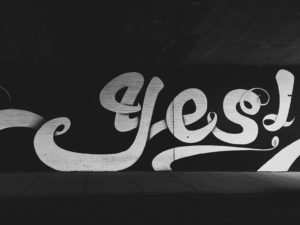by Jenny Rose | Nov 29, 2018 | Choice, Power
Choice: an act of selecting or making a decision when faced with two or more possibilities (Online Oxford Dictionary).

Photo by Jon Tyson on Unsplash
This morning I’ve been reading about doing one thing at a time and having too many choices. I’ve considered the paradox of choice: how important it is to understand our power to choose for ourselves and how unhealthy too many choices can be. I’ve thought about all the subtle ways I limit choice overload in my own life. For example, we have a large DVD collection. I like to watch my favorite movies and series over and over again, so I move through the shelves in alphabetical order when considering what I want to watch next. I do the same thing in our fiction library. My partner, on the other hand, likes to have as much choice as possible and can’t understand why I deliberately narrow the field in terms of entertainment or anything else.
It’s not mysterious. I do it because I don’t like the feeling of floundering around with too many choices. If I want to relax in front of a movie, I don’t want to have to endure an hour of deliberation first. I know I’m healthier and happier when I keep life simple. We know many people, faced with too many buying choices, walk away without buying anything. That’s me. I have a low tolerance for hassle and unnecessary complications.
Choosing is powerful, but there’s also a tricky, dark side of choice. When we’re compelled, addicted, manipulated or numbed, we become divorced from our ability to identify two or more possibilities and our power to choose. We’re asleep at the wheel of our own lives, abdicating both the struggle of choosing and owning the responsibility for our choices and their consequences. We stop learning. We become victims. We all know people like this. They protest their behavior is not their fault. They couldn’t help it. Somebody or something else made them do it. They refuse to be accountable.
According to the above definition, choice is an action. It’s something we do, which implies it can also be something we don’t do. Yet doing, not doing or refusing to choose are all choices. I had a boyfriend once who avoided choice. He wouldn’t say yes to going to the movies. He wouldn’t say no, either. I used to tell him refusing to choose was also a choice that resulted in steering my own choices, but he wouldn’t accept it. He focused his blame on me for the choices I made — in response to his.
The truth is we’re responsible for our behavior and decisions, whether they arise out of conscious choice or not.

Photo by Heidi Sandstrom on Unsplash
Modern American culture does an interesting thing. Our rightful power to choose has become shackled to consumerism. If you want to have a healthier body, for example, a wide array of diet programs, supplements and exercise equipment, clothing and technology is available to you. Want to become more effective and organized? There’s an app for that! Want love and connection? Buy it with diamonds, perfume, makeup, a phone plan, an insurance policy or a car!
We follow blindly along with all this because we’re brainwashed by our media consumption and the overculture. Our choice to improve our physical self-care leads to economic choices, not behavioral changes, even though we all know a gym membership is not useful unless we actually go to the gym and change our behavior! We are seduced onto distracting avenues of endless shiny, tantalizing, seductive promises of exactly what we want, if only we buy the right things.
In the meantime, our lives wither, we become enslaved by money, and the only choice we can recognize is whether to buy brand A or brand B. Our brief flicker of power in deciding to take better care of ourselves is extinguished by guarantees, reviews, special deals, customer service and returns. We give our time and energy to sorting through glittering products, rather than doing the inner work of noticing our self-destructive behavior and learning to manage our choice making more effectively.

Photo by Gemma Evans on Unsplash
I wonder if the power to make free and conscious choices is not the most important thing we can learn — and teach. To be disconnected from our ability to say yes or no is to be enslaved. Enslavement is, of course, the goal of advertising and marketing. Corporations wouldn’t pour billions of dollars into advertising if it didn’t richly reward them. Controlling our buying choices is big business, and our economy rests on it.
Becoming more conscious of our non-consumer choices is perfectly possible, but it requires we wake up and pay attention. It requires a silent place in our lives for inquiry and reflection. It requires a step back from our busy, multi-tasking lives, distractions and deeply-rooted habits. We can’t make free choices if we’re unwilling to be wrong or afraid of unforeseen consequences. We can’t manage choice if we refuse to be honest with ourselves and others. Most of all, we must be willing to take responsibility if we want to manage choice effectively and appropriately.
No one can take away our power to choose unless we allow them to. In every circumstance we can choose something, even if it’s just refusing to be disempowered by difficult events and experiences. It’s never too late to claim our ability to choose, including limiting our exposure to marketing, advertising and algorithms and finding ways to avoid choice overload. Chocolate or vanilla is a lot easier to choose between than 31 flavors.
The holidays are here, and with them even more choices to make than usual. It’s a good time to stay awake, pay attention to what we’re doing and why, and exercise our right to choose what works best for us, even if it’s wildly different from anything we’ve ever done before. We don’t need anyone else’s permission to choose for ourselves, and nobody has the right to choose for us.

All content on this site ©2018
Jennifer Rose
except where otherwise noted
by Jenny Rose | Jan 4, 2018 | A Flourishing Woman, Minimalism
It’s the first week of the new year, and many of us are pausing to look back over our shoulders at where we’ve been the last twelve months and then turning to survey the path before us, at least as much of the path as we can see. The Internet is awash with lists of how to make new year resolutions as well as lists of why we shouldn’t make new year resolutions. Advertising for buying our way to a new persona is frenzied.
As usual, I’m out of step. I’ve read a couple of great pieces this week, one about the limits of willpower and a list of 13 things to give up for success. I’ve read and re-read them, thought about them, and discussed the first article extensively with my partner. Normally when material like this catches my interest it develops into a blog post, but this week nothing is happening.

Photo by Amy Humphries on Unsplash
All I can think about is simplicity.
Lists are great. I used to be a champion list maker. They guided my whole life during a lot of complicated years.
Now? Not so much.
I have really simplified.
But the thing about simplifying is how complicated it is.
For example, more than a year ago I stopped shaving. But that’s not where it started. It started with me deciding I was no longer going to please people. But that’s not exactly where it started, either. Part of it started when I decided to allow myself to be everything I am and nothing I’m not.
If I hadn’t given up on pleasing others and limiting myself, I never would have stopped shaving. It wouldn’t have crossed my mind to do so. Interrupting this lifelong habit never made it onto a list, though it would have been easy to cross off. One decision and it was over.
Making a list of behaviors to discard is wildly misleading, because it doesn’t address what underlies our inappropriate and ineffective behaviors, and that’s where all the ongoing and time-consuming work is.
Pleasing others and making myself small are two lifelong, deeply entrenched habits, and I work every day to make different choices. It’s not easy. I’m not perfect. (Another deeply entrenched habit – perfectionism!) Any distress or inattention results in automatic reversion to my old habits. I don’t expect to ever be able to cross ‘stop pleasing others’ and ‘stop making yourself small’ off a list.
On the other hand, working to change and challenge these two big things allows a whole cascade of smaller habits to loosen and fall away, the kinds of habits that are reasonable to put in a list. Pleasing others and making myself small create an immensely complicated set of actions.
Anyway, one day it occurred to me to ask myself why I shaved.
Answer: Because everyone does. It’s a social rule that women shave their body hair. Hairy legs are unattractive.
The everything-I-am and nothing-I’m-not me: Oh, yeah?
The not-pleasing-other-people me: I don’t think hairy legs are unattractive. All my lovers have had hairy legs. I didn’t mind. In fact, I like body hair. It adds texture and sensation, especially in erogenous zones. I refuse to accept that male hairy legs and armpits are acceptable and female hairy legs and armpits are ugly. That’s ridiculous.
So I stopped shaving.
Ahhh! Simplicity.
No more razors or shaving cream to buy and throw away. No more rashes, nicks or razor burn. Less hot water, less time in the shower. Bonus: In wringing humidity and hot weather, the hair on my legs and under my arms helps me cool more effectively. Another bonus: No more microcuts in my armpits. I worry less about health concerns regarding deodorant. A third bonus: Hairs provide sensory information. If a tick is crawling on me, it stirs the hairs on my body and alerts me to its presence.
I still wear shorts and skirts. I swim every week. My partner appears to be able to deal with a woman in a natural woman’s body without fainting with horror. In fact, I don’t think he even really noticed.
Shaving is just one of many examples of things that can be crossed off lists, but before we can get to those, we have to deal with the big stuff, and that’s hard, ongoing work. The big stuff drives the little stuff. Want to get more exercise? Work on keeping your word to yourself. Want to lose weight? Excavate your relationship with food and redefine it (which means change your life and purge your kitchen).
Simplicity is frequently the end result of complex effort.
On the other hand, some of us have a genius for making simple steps unbelievably complex.
Take exercise, for example. Do you want to exercise more? Really? Then set down the device you’re reading this on, put on clothes appropriate for whatever is outside and (here’s the hard part) walk. You don’t need a dog, a buddy, your mate, special clothes, neon shoes, a Fitbit, a step counter, a timer, a gym membership or a piece of expensive equipment. You don’t need earbuds or entertainment.

Photo by Jon Flobrant on Unsplash
Just. Walk.
Now you’re getting exercise. Do it every day and you’re getting more exercise.
It’s simple. Nike got it right. Just do it.
If it feels more complex than this, it’s not the exercise that’s the problem, it’s some belief or pattern (often deeply buried and unconscious) that’s sabotaging our efforts. And that’s complex!
It’s been very cold here in Maine, as it has in many other parts of the nation. We had heavy snow on Christmas Day. After my daily stint of three or four hours of writing, I wanted a walk, so I layered up and went out into the storm.
Unbroken fresh snow underfoot. One set of tire tracks going up the hill. The chill kiss of wet flakes against the little bit of exposed skin on my face. Wind, and the sound of the trees groaning and creaking and the snow hitting my hood. The sound of my own breath, which condensed on the scarf wrapped around my face, crusting it with ice. My steady footsteps squeaking up the hill. Everything grey and white and shadow.

Photo by Aaron Burden on Unsplash
Christmas Day, and nothing but swirling snow and breathing, walking, the warmth and vitality of my own life. So simple. So peaceful. So starkly beautiful, and nothing to do but inhabit my body and the day.
In these days, fully in the grasp of winter, life is reduced to the wood stove, hot meals, my daily exercise and my writing practice. At 4:30 p.m. it’s dark. Storm and gale, wind chill and subzero temperatures limit our ability to drive. We delve into our piles of books. The cat snuggles with us on the couch. If the power goes out, we light candles and I’m not displeased. At night, the house pops and cracks, groaning in the cold and the wind. Sitting in my comfortable chair with my feet up and a blanket around my shoulders, I doze off as I’m reading The Element Encyclopedia of Magical Creatures. This kind of extreme cold is very simplifying. Eat. Stay warm.
Simplifying my life has made me happier, healthier and more productive. It’s also been frustrating, slow, unpredictable, unexpected, terrifying and painful. It has not looked like an orderly list on a fresh sheet of paper written with my favorite pen. It would be nice if it were that easy, wouldn’t it? Lose weight. Check. Get more exercise. Check. Spend more time with family and friends. Check. Get more sleep. Check.
Those are all worthy goals, and perfectly attainable, but not by writing a list or making new year resolutions. Changing behavior is a great deal more complicated than that, and creating a life of simplicity is an enormous undertaking.
Boy, is it worth it, though!
Happy New Year to each of you.

Photo by Das Sasha on Unsplash
All content on this site ©2018
Jennifer Rose
except where otherwise noted







